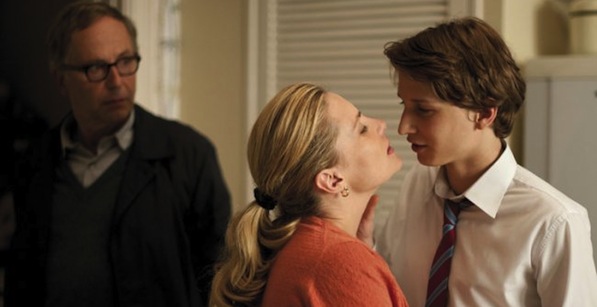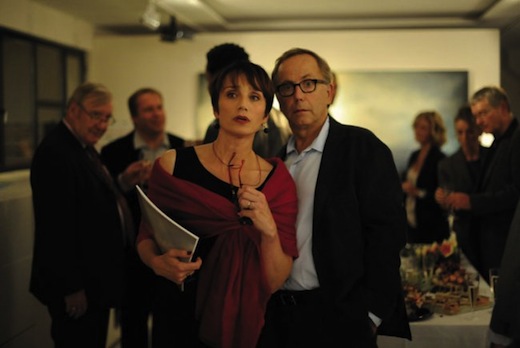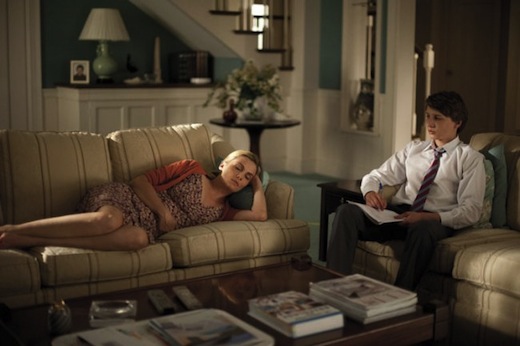In a career spanning a little over 16 years, French director François Ozon has cut a path through European art cinema, using directors as different as Chabrol, Polanski and Antonioni as influences. He’s made austere films like Under the Sand and turned around to produce sexy thrillers like Swimming Pool (still his biggest hit in the U.S., no doubt due to its extensive female nudity and reliance on English-language dialogue.) His work resists categorization. Therefore, it’s fitting that one of the openly gay filmmaker’s constant themes is sexual fluidity. In his latest film, In the House, literature teacher Germain (Fabrice Luchini) becomes excited when his student Claude (Ernst Umhauer) turns in a detailed essay about his weekend and begins to write, with some prodding from Germain, a sort of soap opera about his classmate Rapha (Bastien Ughetto), whom he envies. Germain soon becomes an active participant in Claude’s storytelling. In the House harkens back to the fourth-wall breaking meta-dramas of Alain Robbe-Grillet, as well as Woody Allen’s The Purple Rose of Cairo.
Keyframe: When you first read Juan Mayorga’s play, The Boy in the Last Row, what struck you as something that you wanted to adapt into a film?
Ozon: I was amused by the story. I really liked the character of Germain. Usually, the lessons are imparted by a teacher to a student. In this case, there’s an interactivity between the teacher and student. The young boy is giving lessons to the teacher. It goes both ways. I recognized myself in the story, so I recognized it could be a very personal film, even if it’s not my original material.
Keyframe: Do you see Germain’s manipulative actions as a reflection on the art of direction?
Ozon: Yes, in a certain way. I feel very close to the character, and when I discovered the play, I thought it would be a good opportunity to discuss my process of writing and creating. Actually, I try to tell a different story with options. Mise-en-scene has to do with manipulation. You are a manipulator and voyeur at the same time, and you play with the audience.
Keyframe: With his glasses and sweater, Fabrice Luchini looks a lot like Woody Allen. Was that resemblance intentional, and were you influenced by Allen’s films?
Ozon: Yes. I thought of Allen because of the comfort level of Germain’s life. I thought of Allen and Diane Keaton’s characters speaking about art and life. It’s true that I said to Luchini and Kristin Scott Thomas {who plays the teacher’s wife} that I wanted them to have the kind of chemistry Allen and Keaton had in Annie Hall.
Keyframe: There are several scenes which hint at a homoerotic direction but don’t really go there. Did you ever intend to push that further?
Ozon: When you are writing a script, all options are possible. Sometimes you can go very far away and go back. Art allows you to transgress things you can’t do in life. You can kill someone, you can commit suicide, you can have sex with the mother of your best friend. Everything’s possible, and I wanted to show that in the film.
Keyframe: Do you feel much kinship with other French directors of your generation?
Ozon: I’m very interested in French cinema, but I don’t think I have enough distance to see who’s close to me. I feel very excited about the richness of the French cinema, because we have all kinds of genres. There are some directors I really like, such as Claire Denis and Bruno Dumont, although they’re not very commercial.
Keyframe: You’ve given some great roles to middle-aged actresses, like Charlotte Rampling and Catherine Deneuve. Are you particularly attracted to working with them?
Ozon: I love working with mature actresses because they have a background. They bring a richness to the role, because they’ve lived a life beforehand. I have the feeling sometimes the cinema is obsessed with youth. I like to mix ages. In In the House, there is the character of Fabrice Luchini, who is sixty, and the young boy, who is seventeen. I like to have this meeting of different generations. It’s very exciting and challenging.
Keyframe: Did you find it liberating to incorporate the act of storytelling itself into your narrative?
Ozon: The process of the work allows you different options. There is the writing process, the shooting process, and the editing process. You’re always changing things, you don’t always know what you want to say.
Keyframe: How closely did you adapt the play?
Ozon: I changed many things. It was quite difficult because the author is alive, so I was a little bit uncomfortable. He was very nice. He said ‘Don’t worry. I respect your work. I don’t need to read it. Do your own thing.’ So I was totally free. When you do an adaptation, you have to assume it’s a betrayal. You have to keep what touched you and cut other things. I decided to change the ending, cut much dialogue. In a film, in one frame you can explain many pages of dialogue. When he see the result, the author said ‘You have kept the spirit of my play.’
Keyframe: Do you see a connection between Germain’s contempt for his student’s family and the destruction of families in some of your other films?
Ozon: Yes. What I liked is the fact that there is a kind of contempt or irony, but that step by step, there is an evolution. He empathizes with the Rapha family. At the end, he falls in love with the housewife. He has totally changed his perspective. It was important to me to show this journey. My first few films, like Sitcom, were much more ironic. ‘
Keyframe: Your films are constantly shifting style and genre. Which film would you say is your most personal?
Ozon: That’s impossible to answer. I think all my films are personal, but in different ways. This one is very personal about my emotions, the fact that I need art to express my humanity. I feel very close to Claude and Germain when they’re on the bench at the end. They’re not able to express themselves very well in reality. Like me, they need stories.






